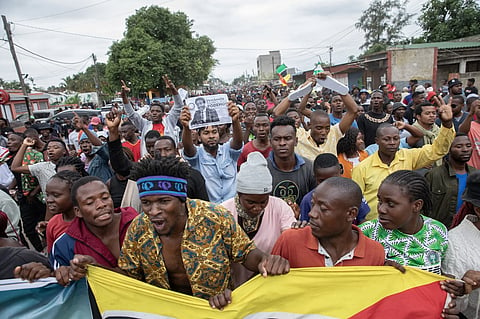
- NEWS
- the EDIT
- COMMENTARY
- BUSINESS
- LIFE
- SHOW
- ACTION
- GLOBAL GOALS
- SNAPS
- DYARYO TIRADA
- MORE

Maputo, Mozambique (AFP) — A national dialogue was announced and a “torch of unity” lit, but many Mozambicans are suspicious about the government’s attempts to address bitter divisions exposed in the last violence-scarred election.
President Daniel Chapo announced the dialogue in March after taking charge of the country of 33 million people that was for weeks engulfed in demonstrations against the results of the October vote in which scores of people were killed.
It will be spearheaded by an 18-person commission that will tour the country to hear the concerns that burst into the open at the election, ranging from youth joblessness to alleged state cronyism.
All political parties have seats and three places reserved for civil society are to be filled by July.
But glaringly absent from the process so far has been the charismatic opposition leader, Venancio Mondlane, who fired up the protests by insisting he won the vote and the official results were rigged.
“Excluding Mondlane also means excluding his people,” said analyst Andre Mulungo of the Centre for Democracy and Human Rights.
The politician, popular with young people, delivered the ruling socialist Frelimo party the strongest challenge of its 50 years in power and rearranged the political landscape with his passionate campaign, brushing aside the traditional opposition.
Not having him on the commission overseeing the planned dialogue undermines the process, said Mulungo, adding: “The risk of these people feeling unrepresented and not recognizing the outcomes of this dialogue is high.”
By the time Mondlane called an end to weeks of protests, around 390 people were dead, according to civil society group Plataforma Decide that tracked the toll.
Most were protestors caught up in a violent police crackdown that also left scores of people wounded and hundreds jailed, it said.
The turmoil — the worst civil unrest since the end of the civil war in 1992 — stalled the economy of the gas-rich but impoverished country, costing half a million dollars and 50,000 jobs, according to government figures.
“There is still enormous disappointment among people regarding the authorities’ brutality,” said political analyst Joao Feijo. “The state must assume responsibility for the damages caused.”
Frelimo will approach the dialogue with the intention of reinforcing its position, Feijo said.
